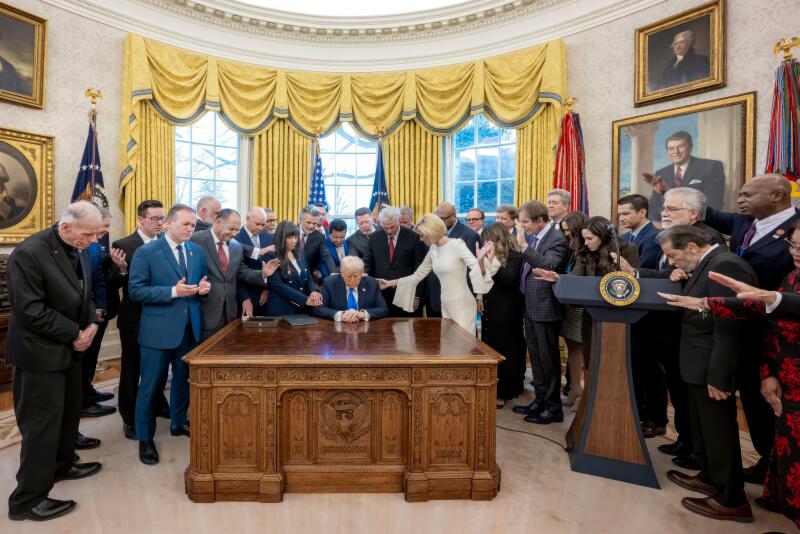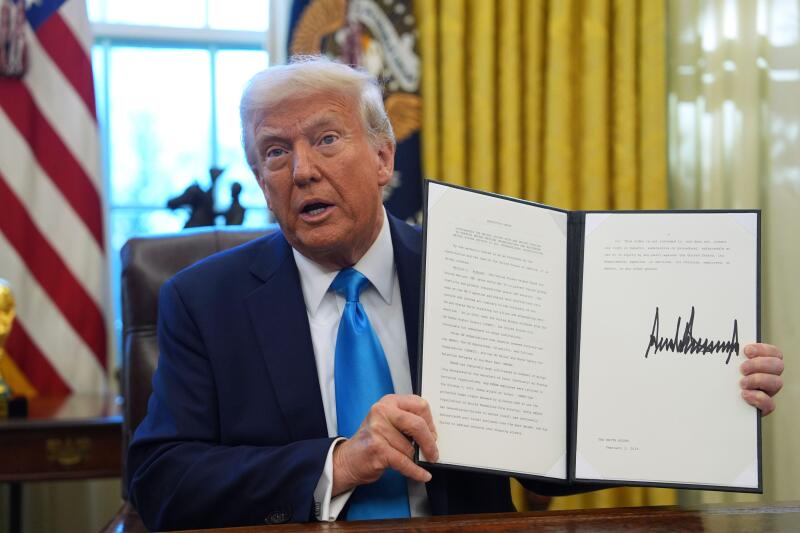
The executive order US president Donald Trump signed on February 4 demanding a review of the US’s involvement in international organisations — including multilateral development banks such as the World Bank, the European Bank for Reconstruction and Development and the Asian, African and Inter-American Development Banks — has caused a stir in the bond market.
These institutions are heavy users of capital markets and the risk, however distant, that the US might withdraw from any of these institutions caused a blip in spreads and prompted rating agencies to rush out reports on the likelihood and consequences of such an event.
However, there can only be one rational outcome from the review: the US must maintain the status quo.
To put it in the transactional terms Trump is said to favour, his country already has the best end of the bargain from its membership of the MDBs.
Sources say every incoming US government reviews the country’s involvement in international organisations. However, this is done quietly, without the fanfare of an executive order from the Oval Office. But how much should be read into the one Trump signed last week?
On one hand, Trump is a natural showman who loves to say the unsayable to capture attention as an end in itself.
Furthermore, as many have noted, his bark is often worse than his bite — for instance, the almost instant delay in his imposition of tariffs on Canada and Mexico last week.
Then consider the evidence of Trump's first stint in the White House: after some huffing and puffing, he basically backed the MDBs. There were capital increases and replenishments for the International Bank for Reconstruction and Development, the International Finance Corp and the International Development Association. His own daughter, Ivanka, lent her support to a women’s entrepreneurship fund the World Bank launched in 2017.
‘The conservative moment’
The fear is that this time it’s different. There is a sense that Trump is better prepared for government this time and has a fuller sense of what he wants to do.
His administration has a more serious ideological thrust, with influential people and groups trying to push Trump further to achieve their aims.
One such organisation is the Heritage Foundation, a far right think tank which two years ago published 'Project 2025'. It describes the Project as “the conservative movement’s unified effort to be ready for the next conservative Administration to govern at 12.00 noon, January 20, 2025”.
Among its radical recommendations is that the US “should withdraw from both the World Bank and the IMF and terminate its financial contribution to both institutions”.
“If the US is to provide economic assistance or humanitarian aid to other nations,” it goes on, “it should do so unilaterally.”
That would be a serious mistake.
The MDBs are institutions which magnify the US's power and financial contribution.
In every one in which it is involved, the US is the largest, equal largest, or in one case the second largest shareholder.
That means it is top dog among the nations that control the bank. These institutions work by consensus: there are disagreements, but they get resolved by a compromise. No one likes a falling out.
Therefore, very little gets done at the MDBs that the US does not like.
At all the World Bank institutions, in particular, the US has not just de facto but de iure veto power, since it holds more than 15% of the votes, and an 85% majority is needed for important policy decisions.
As is well known, by convention the president of the World Bank Group has so far always been a US citizen.
Before the incumbent Ajay Banga, its previous president, David Malpass, was a Trump choice.
Even if the staff of the Bank, IMF and Inter-American Development Bank are multinational, the organisations are all headquartered in Washington, DC.
Moreover, the US has been remarkably successful at defending its exceptional influence at the MDBs and IMF. Developing countries led by China have pushed to be allowed higher stakes, but been denied.
The US share of world GDP is now about 27%, so its financial contribution to the World Bank Group, for example, at 16.7% of the total is well below what might be considered its fair share.
What benefits does the US get with its influence?
They are enormous.
The major MDBs that the US is involved with, and the IMF, typically espouse capitalist solutions to development problems. They have been doing so since they were founded, and in some developing countries have probably been the single most influential factor guiding these states towards free and open markets.
The US has always seen this as highly advantageous to its own interests, which have been to expand economically by selling its products globally, and investing profitably in other countries. This is no secret: US policymakers have been quite explicit about it.
The US's grip goes further. For many poor countries, the multilateral institutions are not just helpful, but a vital lifeline. Depending on these Washington-based, US-controlled institutions creates a powerful incentive not to offend the US.
The MDBs also enable the US to support all kinds of important humanitarian causes, dear to the hearts of millions in emerging markets: healthcare, education, sanitation, water supply, electricity, agriculture and protection from climate and environmental disaster.
The China balance
High among US conservatives’ concerns is the idea that China is a threat to the US's global influence. They believe China gets a free ride from the World Bank, despite its growing economic power.
Though it now has $3.2tr of foreign exchange reserves, China still counts as a developing country for the MDBs, and can borrow from them at concessional interest rates.
“With the World Bank, we have let China take advantage of us,” Wilbur Ross, founder of a private equity firm and Trump’s commerce secretary throughout his first administration, told the New York Post last month. “It seems ludicrous that we, as the largest shareholder of the World Bank, permit China to be such a big borrower from it.”
In truth, China is repaying loans from the World Bank at twice the rate at which it is borrowing from it, so its loan balance is falling.
But that does not remove conservatives’ concerns that China is getting an unfair advantage.
The Heritage Foundation frets over China’s growing developmental influence, exerted via what it calls its “trillion dollar” programme of infrastructure projects, known as the Belt and Road Initiative (BRI).
“[China] leverages its transactions — termed 'debt traps' by many critics — to strengthen its global influence, extract natural resources, isolate Taiwan, win political support at international fora, and access ports and bases for its military,” it says.
China has certainly been throwing its cash around. Between 2013 and 2021, it stumped up $679bn for infrastructure projects through the BRI in five key sectors, according to the US Government Accountability Office, an average of $75bn a year.
The US only managed $76bn of similar investment — $8.4bn a year.
Trump's government — and the Heritage Foundation — should ponder those figures carefully, and another.
In 2023 alone, according to GlobalCapital analysis, six major MDBs in which the US is a leading shareholder (the IBRD, IFC, ADB, AfDB, EBRD and IADB) disbursed about $89bn.
On its own, the US's development influence is dwarfed by China's. Through the MDBs, it gains credit and advantage from development lending that is still of the same magnitude as China's.
Rare luck
Would the US do better by, as the Heritage Foundation argues, pulling out of multilateral institutions and engaging in development finance only on its own?
Leaving out all soft power factors and looking only at numbers, it would lose spending power by pulling out.
The major MDBs all take their capital and keep it. They leverage it up by issuing bonds, by between 1.5 and 5 times. The resulting money is used for development finance, while the capital stays in place, supporting lending year after year after year.
At the World Bank, for example, the US has only ever contributed $3.76bn of capital since the institution was founded in 1944. But the Bank has been doing multiple billions of lending every year for most of those 80 years — in 2023, $26bn.
The multiplication factor the US has achieved with those dollars must be well over 100.
On its own, the US would have to find a new dollar for every dollar it lent — at least until loans started to be repaid.
Of course, it could set up its own, mononational development bank — but since this would not have diverse shareholders or a track record, it would not be as creditworthy as the multinational ones, and would therefore be less efficient.
That $89bn of financing that six US-led institutions laid out in 2023 was achieved at the expense to the US of a mere $15.2bn.
That sounds like a bargain on its own. But the $15.2bn is the total US capital contribution to these institutions over all time, since 1944. And the $89bn, or a similar figure, is reproduced again, every single year. The running cost to the US is nil.
If that is not enough to warm the heart of any red-blooded, efficiency-loving conservative, an analogy might help.
The US's minority, but decisive, shareholding in the MDBs can be likened to a capitalist investor who holds a 40% controlling stake in a holding company that in turn owns 30% of a large listed company. With just a 12% financial contribution, the investor can control the large company.
In or out
What should the US do with this remarkable asset?
Pulling out, or reducing its capital contribution, would not abolish the MDBs. It would simply hand control to other countries.
They would step in and take the US’s place as a shareholder — as happened when Brexit tossed the UK out of the European Investment Bank.
Countries increasing their stakes would certainly include China, a big believer in MDBs. It has co-founded two to extend its influence — China is the biggest shareholder in the Asian Infrastructure Investment Bank, located in Beijing, and the joint biggest in the New Development Bank, headquartered in Shanghai.
Those in the US worried about the growth of China's power must recognise that the MDBs are a buffer that helps the US resist it.
Pulling out would not just remove that buffer, it would hand at least some of it to China.
All of this is not to say that the US shouldn’t flex its muscle as a shareholder in the MDBs if it believes its interests are not being served — that is its right.
But any analysis of the MDBs and IMF, the massive benefits they provide to the developing world and that the US derives from its membership in them, must conclude that the best option is to stay at the heart of them, as a committed, constructive participant.
For the US, turning its back on the multilateral institutions would be like trying to win the game by walking off the field.



